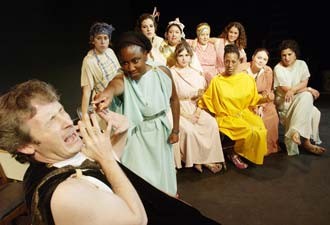Lysistrata's anti-war message resonates 2,500 years on
It's comforting to think of Aristophanes in 411 B.C., seated with an unchiseled tablet in front of him, creatively paralyzed by thoughts of the war that had been taking the lives of Athenian men for the last 21 years. When the war was only 6 years old, he tried to change someone's, anyone's mind with his anti-war comedy The Acharnians. But who listened? What's the point of comedy when the tragic shucking of your homeland's founding principles haunts you everyday? If those questions puzzled one of the great comic minds in history, maybe our current befuddlement at a similar situation isn't so unforgivable.
| From left: John Poole, AnnMarie T. Saunders, Latrelle Bright, Samantha Karam, Martha Buchanan, Alegria Garcia, Rose Cohen-Brown, Jenelva Carter, Kathleen O'Neal, Kate Lowry, and Crystal Bratton in the Renaissance Guild and Shoestring Shakespeare Company's production of Lysistrata. (Photos by Mark Greenberg) |
In his desperation, however, the dramatist found his solution: Give the anti-war funny business another shot, except this time use the not-yet time-tested method of sexual titillation to get the public's attention. Lysistrata may not have changed anyone's mind about the war, but the strength and innovation of Aristophanes' message has kept it viable over centuries, offering intrepid, peacenik theatre troupes a rich foundation upon which to build their own anti-war message.
The Renaissance Guild did just that in their co-production with The Shoestring Shakespeare Company of the play, the latest installment in the Main Stage series, which continues through July 31 at the Jump-Start Theatre. Director Mellissa Marlowe and writer/actress Alegria Garcia place the story, in which the women of Athens forsake sex in order to secure peace in a modern setting, or rather, an ancient setting with a modern lexicon. Direct references to the Peloponnesian War and the presence of togas are interspersed with a taqueria, a touch of Victoria's Secret, and a modern take on ancient social strata that involves plungers and Drano.
Marlowe accomplishes a lot with a little, stripping down the production to the bare essentials to reduce the spectacle (though several cast members who remain scantily clad for more than half of the show adds the right amount of P. T. Barnum to the mix) and bring Garcia's words and Aristophanes' ideas to the fore.
A good thing, since Garcia's adaptation gives the performers ample room to freewheel with the material. Though the dialogue has obviously been written out, at times Lysistrata still feels off-the-cuff, as if the actors are riffing on ideas heedless of where they will lead. No one pulls this off better than Latrelle Bright, who steals the show with her frustrated, motivated, yet doubting portrayal of the titular agitator.
The Guild manages to avoid the ambiguous relationship Aristophanes seems to have with his female protagonists. Despite the obvious victory of the rational, compassionate women over the war-mongering men, the more subtle message of the original seems to be: If even Grecian women can figure this out, the men must be really thick. Instead the protestors are empowered, but not any more or less ridiculous than the men in their attempts to carry out the plan. In place of veiled gender bashing, then, is a class commentary that quietly rumbles until the last scene. Alone it's an interesting twist on the triumphant ending of the original, but taken in context with the current war, it's a bit puzzling.
At times during the play I found myself wondering: How desperate does the situation have to become before extreme tactics are deployed? And while I don't think Marlowe, Garcia, and the rest of The Renaissance Guild are advocating a sexual nuclear option, they are asking how far short of that is the reasonable limit for non-violent resistance. •
By Aaron Block


